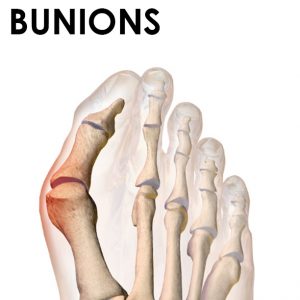A bunion is a bony bump that forms on the joint at the base of your big toe. This condition occurs when your big toe pushes against your next toe, forcing the joint of your big toe to get bigger and stick out.
The underlying cause of bunions is a deformity of the joint at the base of the big toe known as the hallux valgus. In this deformity, the joint develops a prominent sideways angle, which pushes the bones of the big towards the smaller toes.
Smaller bunions, known as bunionettes, can also develop on the joint of your little toes.
As a bunion develops, swelling, redness and pain is typically felt at the base of the big toe and in the ball of the foot. Eventually, the area becomes shiny and warm to the touch.
All bunions are permanent unless surgically corrected, but there are some measures you can take to be more comfortable or to slow a bunion’s progression.
What causes bunions?
For most people, bunions are a hereditary condition that typically develops in early adulthood and get worse as the foot spreads with aging.
In some cases, bunions have been associated with certain types of arthritis, particularly inflammatory types, such as rheumatoid arthritis. An occupation that puts extra stress on your feet or one that requires you to wear pointed shoes also can be a cause.
In people with leg length discrepancies, bunions usually form in the longer leg.
Tight-fitting shoes can also play a part in the creation of bunions. Shoes that have a sloping foot bed and a narrow toe box such as high heels cause the front of the foot to be pushed with force into the narrow toe box, causing the toes to become squeezed together.
For this reason, women are especially prone to developing bunions due to years of wearing tight, poorly fitting shoes.
Although they don’t always cause problems, possible complications of bunions include:
- Bursitis: This painful condition occurs when the small fluid-filled pads (bursae) that cushion bones, tendons and muscles near your joints become inflamed.
- Hammertoe: An abnormal bend that occurs in the middle joint of a toe, usually the toe next to your big toe, can cause pain and pressure.
- Metatarsalgia: This condition causes pain and inflammation in the ball of your foot.
When should I see a podiatrist?
Dr. Ian S. Goldbaum, a podiatric physician and surgeon with over 30 years of experience, says that the symptoms of bunions are hard to ignore and that there are a few easy warning signs that signal it’s time to see a doctor.
“Once a person starts feeling pain in their first metatarsophalangeal joint (big toe join) or the toe looks like it’s not staying straight and veering over, then it’s time to see a doctor,” said Dr. Goldbaum.
Your doctor can identify a bunion by examining your foot. Watching your big toe as you move it up and down will help your doctor determine if your range of motion is limited. Your doctor will also look for redness or swelling.
After the physical exam, an X-ray of your foot can help your doctor identify the cause of the bunion and rate its severity.
—
Follow Delray Beach Podiatry on Twitter @Delray_Podiatry
The content on this website is for informational purposes only. Do not rely or act upon information from www.DelrayBeachPodiatry.com without seeking professional medical advice. If you live in South Florida and would like a consultation with Dr. Ian Goldbaum, a podiatric physician and surgeon with over 30 years of experience, please see our contact information below:
BOCA/DELRAY
16244 S. Military Trail #290, Delray Beach, FL 33445
561-499-0033
BOYNTON BEACH
8198 Jog Road #100, Boynton Beach, FL 33472
561-499-0033


No responses yet